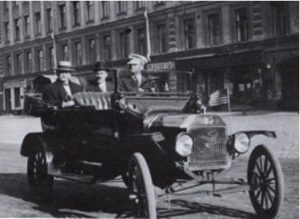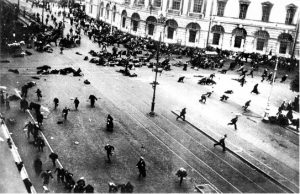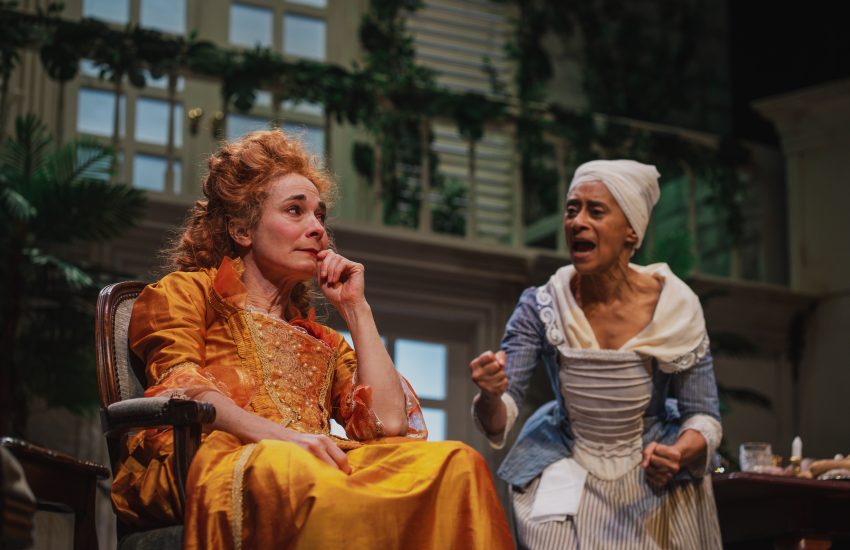Witness to the Russian Revolution: The Odyssey of Philip Jordan
By Robert Fikes, Jr., Emeritus Librarian, San Diego State University
A century passed before an award-winning British historian would give long overdue recognition to an African American who provided a unique, firsthand account of the turbulent Russian Revolution that ignited on March 8, 1917 on the streets of Petrograd. The early life of the son of a former slave, who wound up so far from his Missouri roots, eventually returning home and finally settling in California, stands in distinct contrast to his sometimes-terrifying foreign adventure.
In a 1978 article in History Today, Russian history professor J. H. Cockfield quoted from several of the many letters, (archived at the Missouri Historical Society), which were authored by Philip Jordan and sent from Petrograd (now St. Petersburg) that gave compelling descriptions of often bloody skirmishes that pitted partisans against soldiers and against one another. Though replete with misspellings, idiosyncratic punctuation and capitalization, his prose was nonetheless compelling, often stark, folksy, ironic, and laced with unintended humor. Notwithstanding the noteworthy fact that he was African American, most significant were his observations recounting terrifying predicaments from the rare, on-the-ground point of view of a working-class man of his era, not the perspective of someone more privileged and literate, whether Russian or foreigner.
Born in 1868 in Jefferson City, Missouri, the state’s capital, Philip Jordan misspent his youth as a fearless brawler, gang member, and drunkard in his hometown’s impoverished red-light district called Hog Alley. His expressway to an early grave took a fortunate detour in 1889 when, on the recommendation of a former employer, he was hired as a valet for David Rowland Francis, a former mayor of St. Louis and then Governor of Missouri. An unusual closeness developed between Jordan and all the members of the Francis family, despite his occasional slip-ups. He was especially close to his employer’s wife, Jane Francis, who taught him to read and write and was known to intercede on his behalf when he periodically lapsed into his worst failing: alcoholism.
No one doubted Jordan would accompany Francis to Petrograd after President Woodrow Wilson picked him as U.S. Ambassador to Imperial Russia with the intention of having him negotiate a new trade agreement, while Jane, refusing to suffer through a long sub-zero winter, remained at their St. Louis mansion. The inseparable pair arrived at the American Embassy at 34 Furshtatskaya in the centre of the imperial capital, on April 13, 1916. Jordan soon learned enough Russian from Madame Matilda de Cram (a Russian friend of Francis, possibly a spy, who frequently visited the embassy) to interact effectively with merchants and others who made embassy life bearable. Jordan was required to be more than body servant. He morphed into the ambassador’s man Friday or majordomo as normal circumstances rapidly devolved. He haggled with food and liquor vendors to keep embassy kitchen cupboards stocked and formal visitors and party guests properly entertained. He even proved adept at procuring black market contraband. Finding the meal choices of the embassy’s Russian chef lacking, Jordan replaced him with, of all people, a ‘Negro’ from Trinidad who, strangely enough, happened to be in the vicinity. Within a couple of months Jordan transitioned to chauffeur when the ambassador took delivery of his Model T Ford with an American flag attached to a headlight. Oddly, in a society where paranoia, spying, and informing were pervasive, Petrograd’s Chief of Police granted him permission to take photographs in the city.

The relative quiet before the storm ended by mid-winter as political turmoil and starvation wracked the empire. An increasingly tense Petrograd trembled as protesting factory workers, demoralized soldiers with no interest in fighting to fulfill Czar Nicholas II’s ambitions in the First World War, overly aggressive police, and desperate, half-starved peasants streamed into the heart of the city, making for a highly combustible situation. Those casual strolls Jordan and Francis took together became too risky. The embassy’s eighteen guards could easily be overwhelmed by an angry mob. Random gunshots, boisterous and violent demonstrations, frozen dead bodies, and blood-stained snow became commonplace sights to anyone brave enough to venture outside.
On the evening of April 9, 1918, Jordan interrupted the ambassador and his guests to announce that a group of black-flag-waving anarchists were on their way to attack the embassy. He loaded the ambassador’s revolver. Decades later Jordan recalled: “I got it but I asked him please not to fire it. He had never fired a gun in his life, so far as I know, and I knew if he fired at that crowd, it would probably be the end of both of us.” On the evening of July 4, he personally watched raging Cossacks, fiercely loyal to the Czar, ambushed by demonstrators then savaged by Bolsheviks manning barricades with machine guns. Though shaken, he later described the incident in a letter to Jane Francis:
“The Cossacks and (mutinous anti-government) Soldiers had a terrible fight just one block from the embassy. The Cossacks as you know always fight on horseback. They made a charge on the soldiers who was in the middle of the street with machine guns and cannons. My oh my what a slaughter. After thirty minutes of fighting [I] counted in a half a block 28 dead horses. When the Cossacks made their charge the soldiers began to pump the machine guns and you could see men and horses falling on all sides.”
Sporadic gunfire preempted sleep. Ever curious, Jordan slipped out of the embassy around midnight and rushed in the rain to the Palace Bridge to see for himself what was happening. He continued:
“The Bolsheviks had Started to come on this side of the town and the Soldiers was waiting for them at the foot of the bridge. Just as they was about on the middle of the bridge the soldiers opened fire with machine Guns and cannons. it was one grand Sight. the Sky was full of the prettiest fire works you Ever saw you know during a Revolution or any kind of fighting every body has to lay flat on your Stomach. I was laying flat behind the man that was pumping the machine Guns.”

Francis wrote home that despite the danger he did not feel Jordan was ready to flee to Missouri because Jordan had kidded “we are having so many revolutions here now that it is too interesting for us to think of leaving.”
On July 15, Jordan viewed elaborate ceremonies attending the Orthodox funeral services at Kazan Cathedral for seven Cossacks, followed by a military procession that halted at the Alexandre Nevsky monastery where the bodies were interred. Jordan recalled: “. . . the press Said Over one million people. . . think of such a large crowd and all frightened half to death. Every time the man would strike his base drum the crowd would Shiver. The report got out that at three o’clock that the Black Hundred (ultra-right monarchists) would start throwing bombs.”
By early October it was apparent the Reds had gained the upper hand in its contest with the more moderate socialist Mensheviks and its sickly leader, Alexander Kerensky, head of the provisional government. Rumour spread that, should the Bolsheviks ascend to power, the bourgeoisie would be suppressed and foreigners would be executed. Francis downplayed the rumours but Jordan thought they had better prepare for the worst:
“Some Days and nights you will See on the Nevsky Prospect ten or twenty thousand marching with black flags and banners reading we are on our way to kill all Americans and all rich people—that includes me and (whoever) has on a white shirt. I will tell the Gov. that they are on the way again to kill us. The Gov will say all right are you ready. I will say yes I am ready so the Gov will tell me to load the Pistol and see if She is in working order. he Says that he will get to or three before he goes.”
Having survived the horrors of those ‘July Days’, the failed coup of General Larv Kornilov, and the October Revolution that resulted in the Bolsheviks, led by Vladimir Lenin, seizing power in Petrograd, Jordan wrote to Jane’s cousin, Annie Pulliam, on November 17: “We are all setting on a bomb Just waiting for some one to touch a match to it . . . These crazy people are Killing each other Just like we swat flies at home.” Though inherently unsafe, he was forced to travel farther and farther from the city in the Model T to buy food and other necessities for the embassy. Political instability gave birth to rampant fear, anxiety, and immorality. Jordan characterized a dire situation as follows:
“Streets are full of all the cut throats and robbers that are in Russia. you can hear the machine guns and cannon roaring all night and day. thousands are being killed. why we are alive I can not tell. they break into private homes and rob and kill all the people, in a house not very {far} from the embassy they killed a little a little girl and 12 rifle bayonets found stuck through her body. oh the horrible Sights that is to be seen . . . I have fond out that the best thing to do right now is keep your mouth shut and look as much like an American as you can . . . All the thugs that have been turned out of prison was armed with a rifle . . . we cant tell at what minute the Germans will take Petrograd. If they come right at this time I don’t know what we would do because we cant get out. we are like a rat in a trap. the Bolsheviks have torn up all the rail roads. I cant tell but this Ford might be a life Saver. All the business houses and banks are closed. The city is pitch dark. At times we only have tallow candles for light, the plants have no coal and Very little wood.”
The triumph of the Bolsheviks did not immediately extricate Russia from hostilities vis-à-vis the Central Powers, and diplomats of the Allied Forces felt exposed to an assault from the German army. Francis persuaded the foreign diplomatic corps to heed his advice and leave Petrograd on February 26, 1918 and relocate about 650 kilometres east to the peaceful city of Vologda. For several months he and Jordan enjoyed their stay in a ‘dandy’ two-story house. Jordan scouted the countryside searching for a suitable spot for the ambassador and others to play golf. They left Russia in October after Francis contracted a serious gall bladder infection. In his last letter from Russia, Jordan expressed his amazement at the reorganization of society imposed by the new regime, for example what happened when shop owners ignored an order to clear snow in front of their businesses and were heavily fined and made to remove snow throughout the city. He commented:
“These Bolsheviks are treating the rich oh so bad. Just think, a man that was very rich two or three months ago, worth millions of roubles, is now cleaning snow on the street for 6 or 8 roubles a day. They must either do that or starve.”
Francis convalesced in Scotland and, along with Jordan, enjoyed an after-Christmas dinner with British King George V and Queen Mary at Buckingham Palace. Finally returning to the United States in February 1919, they accepted an invitation to visit the White House, then occupied by President Woodrow Wilson. Jordan had greeted four American presidents at the Francis mansion in Missouri, but the White House visit was truly special. Years later he quipped: “I was born in Hog Alley and I think you know that a kangaroo can jump further than any other animal, but I don’t believe he could jump from Hog Alley to the White House—that was some jump.” When Jordan told of his departure from Russia via Murmansk and the Arctic Circle, he was also known to boast that no other black man save for Matthew Henson had journeyed as far north.

Ten years after the start of the Russian Revolution, Francis died in St. Louis. Jordan remained with the Francis family and in his old age was well provided for. He followed the ambassador’s son, Perry Francis, to his residence in Santa Barbara, California, where he died from cancer on May 20, 1941. In the final paragraph of her 2016 bestseller, Caught in the Revolution: Petrograd, Russia, 1917 – A World on the Edge, British historian Helen Rappaport gave long overdue recognition for Jordan’s journalistic achievement when she wrote:
“. . . there is one voice above all others that strikes a nerve in its own inimitable way; the utterly truthful, ingenious voice of an obscure African American, Phil Jordan, an unlettered man and political innocent, and a loyal servant of U.S. diplomacy, who lived to tell the tale. His glorious letters, written in his vivid vernacular style, and reflecting an enduring sense of being ‘a stranger in a strange land,’ remain the only known published account of the revolution by an African American. They provide us with an unforgettable sense of exactly what it was like to be caught, in Petrograd, in the Russian Revolution of 1917.”


